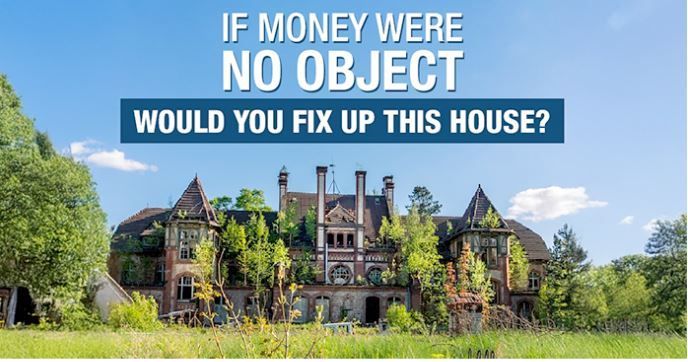
Is Paying More for an Updated Home Worth It? Here’s How to Decide
If money were no object, would you Fix up this house?

If you’re in the market to buy a home, you probably want to negotiate the best price possible. But in today’s market, getting the best deal isn’t just about negotiating the lowest price—it’s about making a smart financial decision that balances cost, convenience, and long-term value.
Even if you’ve just started your home search, you’ve probably noticed that updated homes are often difficult to find and sell faster and at higher prices than homes that need some sprucing up. But how much more may not be so obvious…
Well, according to a recent press release, homes that are “remodeled” currently sell for nearly 4% more than expected, as opposed to last year when they only contributed to a 0.8% sale price premium.
This demand for updated homes signals a shift from the past when buyers were more willing to take on fixer-uppers. But does that mean paying a premium for a move-in-ready home is the best choice for you? Not always. The key is understanding when paying a premium for an updated home is worth every penny, and when rolling up your sleeves and tackling a few projects might be the better move.
The Math Behind Move-In-Ready Homes: Why Paying More Pays Off
For many buyers, choosing a home that needs work was once an appealing way to get more house for the money. But with today’s financing rates and inflation driving up renovation costs, that strategy isn’t always as cost-effective as it used to be.
The press release cited above also mentioned that fixer-uppers now sell for 7.3% less than comparable move-in-ready homes, which is the largest discount in three years. On the surface, that sounds like an opportunity. But the reality is that rising material and labor costs can quickly erase those savings. A kitchen remodel alone can easily exceed $50,000, and unexpected repairs often push budgets even higher. In some cases, paying a little more for a home that’s already updated can actually be the more affordable long-term option.
That doesn’t mean fixer-uppers are off the table. But if you’re considering one, it’s important to approach it with a realistic renovation budget, and an understanding that costs can change quickly. The home that seems like a better deal could become a financial headache if renovation prices climb beyond your expectations.
From an investment perspective, the financial math behind home improvements rarely favors the buyer who tackles renovations themselves. According to the 2024 Cost vs. Value Report, most remodeling projects don’t even provide a dollar-for-dollar return, let alone a profit. While minor updates—like replacing your garage door or front door—often offer solid ROI, big-ticket renovations like full kitchen overhauls or high-end bathroom remodels rarely recoup their full cost in resale value. And let’s be honest, when people think “updated,” new kitchens and bathrooms are the types of things buyers envision, not a couple of doors.
That’s one reason why many buyers are willing to pay more upfront. Instead of dealing with renovation stress, unexpected costs, and the hassle of living in a construction zone, they’re choosing the convenience of a move-in-ready home. And with the added bonus of being able to finance that cost over 30 years, the monthly payment difference might not be as significant as it seems at first glance, and likely more appealing than having to dip into the savings account or rack up the credit card bill.
When Paying More Makes Sense (And When It Doesn’t)
So, should you be willing to stretch your budget for an updated home? It depends. Here are a few things to consider:
When it makes sense to pay more:
- You don’t have the time, patience, or expertise for renovations. Even minor projects can take months and often go over budget.
- You want cost predictability. With an updated home, you’re not rolling the dice on how much renovations will actually cost.
- The updates are worth more than the premium you’re paying. If you can buy an updated house for less than it would cost you to update any other options available to you, it’s likely a smart financial decision.
- There just aren’t a lot of updated homes that come on the market. If renovated homes are few and far between, paying more for the opportunity to buy one can be money well-spent.
When buying a home that needs work might be the better move:
- You have renovation experience or trusted contractors. If you’re handy and able to do the work yourself, or you’re able to hire contractors at a reasonable price, you may be able to save significantly.
- You’re comfortable living through renovations. Some projects, like painting or flooring, can be done room-by-room over time, making it easier to live around. But if you need to do major kitchen or bathroom renovations, or gut the entire house, you’ll either need to be comfortable living through the chaos, or have a place to stay in the meantime.
- You’re in a market where fixer-upper discounts are larger. In some areas, the price gap between updated and non-updated homes makes renovations a more viable option. If you can get a house that needs work at a substantial discount, and do the work for less than it would cost to buy an updated one, it might be worth the effort.
- There just aren’t a lot of updated homes that come on the market. If renovated homes are few and far between, and you’re having trouble getting your offers accepted due to stiff competition for the few updated homes, it might make sense to buy one that needs work.
Every buyer’s situation is different, and there are cases where buying a home that needs work can still be a good investment. The key is to go in with clear expectations and a solid understanding of the true costs involved.
Working with a great real estate agent can help you evaluate your options and make a decision that aligns with your goals and budget. They can:
- Help you compare updated and fixer-upper homes in your target market to see where the best opportunities lie.
- Connect you with contractors and help you gather renovation cost estimates so you know what to expect before making an offer.
- Help craft offers that give you a competitive advantage without overpaying.
The Takeaway:
Paying more for a move-in-ready home might seem like a splurge, but in reality, it’s often the smartest financial move. The best deal isn’t always about getting the lowest price—it’s about getting the best value.
If you’re looking at a fixer-upper, make sure the discount justifies the work and expense required. If you’re leaning toward a move-in-ready home, know that you’re not just paying for convenience—you’re paying for financial predictability and peace of mind.
No matter which route you choose, the right strategy can help you make a decision that stands the test of time. And that’s where working with an experienced real estate agent can make all the difference.

Business Hours
Monday-Thursday: 7:00 am – 4:30 pm
Lunch: 12:00 pm – 1:00 pm
Friday: 8:00 am - 12:00 pm
Saturday & Sunday: Closed




